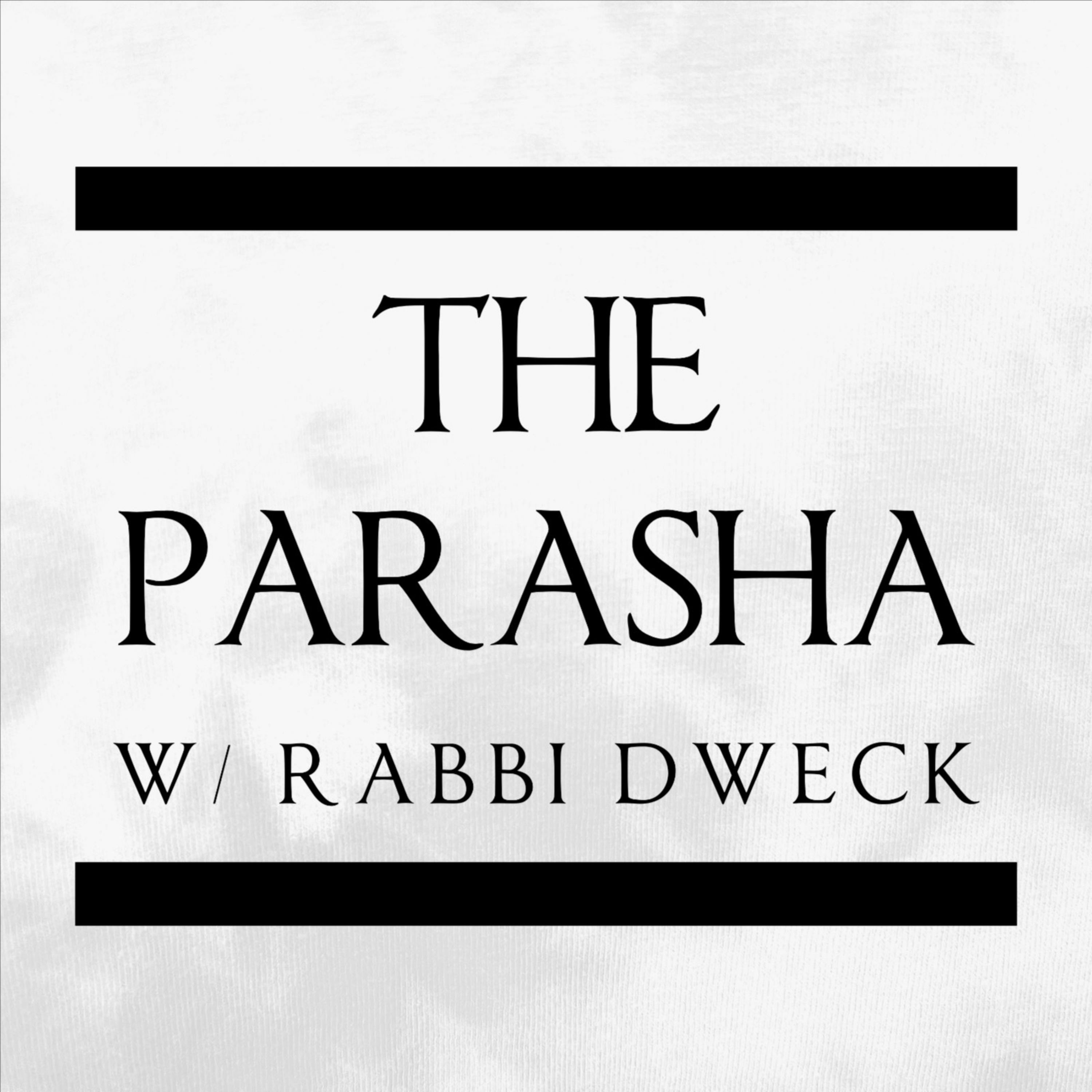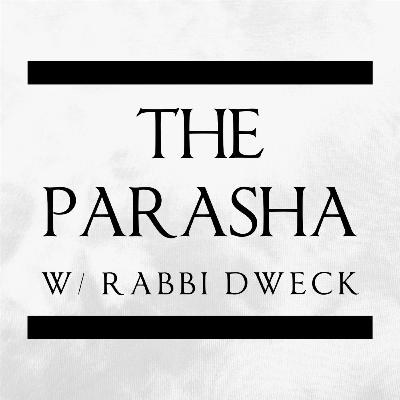Discover The Parasha with Rabbi Dweck
The Parasha with Rabbi Dweck

141 Episodes
Reverse
Jacob finds himself alone and in a precarious position while he anticipates meeting his twin brother after 20 years. Esav is on his way towards him with 400 men and there is no indication that it is friendly. Jacob prepares through prayer and pragmatism, but must experience a powerful struggle which will determine how the fateful meeting will unfold. In this episode we examine the struggle and what we can draw from it about being Jewish in the world.
In this episode we look at the marriage of Rebecca and Isaac - particularly Rebecca's complete lack of hesitation to go to him once she determined it was the right thing to do for her life. We explore procrastination, why it's important to pay attention to and what we can do about it.
First episode of the new season, and we've got video! We will continue to work on improving the video and audio quality of the podcast. Hope you enjoy the upgrade. This week we look at how we are meant to relate to the parasha of Bereshit and through it, the Torah as a whole. Is it meant to describe to us the nature of the world scientifically? And if not, what is it meant to be? We explore that question and with it, the implications of the crisis of meaning in which we find ourselves today - but in all of it, is a bright silver lining....
The book of Debarim opens with Moses' final words to the Children of Israel before he dies. This is significant because we are introduced to him as being "not a man of words". Moses goes through one of the greatest arcs of personal development in the Jewish Bible. In this class we examine the nature of that development and what we might take from it for our own lives.
Korah raises a rebellion against Moses and Aaron and insists that the entire nation is holy and does not need the two of them as leaders. Yet, he insists that his system is correct and challenges the leadership with a veiled bid for his own. In the end, Korah is literally ejected from the nation by God Himself and swallowed by the earth. In this episode we look at what the Talmudic sages thought happened to make Torah do this and we explore some of the deeper ramifications for ourselves.
The Children of Israel are beginning their journey through the desert to the Promised Land and God instructs them as to how they should travel. It is by the rising of the cloud from atop the Mishkan that they are to move and stop and camp when it rests. Simple enough. But the Torah makes sure to be explicit with every scenario and tell, in what ostensibly is quite redundant terms, how they traveled. In this episode we explore why and what we might learn about living life from it.
Naso is the longest parasha in the Torah. What makes it so, however, seems to be entirely unnecessary. Its end lists again and again identical gifts brought by the 12 heads of the Tribes of Israel for the Inauguration of the Mishkan. While it could have been condensed for brevity, it is not. We explore why in this episode and consider its implications on our unique lives and the importance of consciously living them.
The children of Israel prepare to embark on a journey through the desert to the promised land. It begins, however, with a census. This census has the people speak their names. In this episode we explore the significance of this census and why a journey through the desert can be a productive endeavour in self discovery.
Here we study the importance of recognising what is and is not in our control and why it is so important in living our lives.
Emor focuses a great deal on the contrast between the sacred and the non-sacred. Amongst these are the special festivals that are sacred days in our Jewish calendar. We look at each of these and consider their particular meaning along with the their place as punctuated times on the Jewish year and how they impact our lives.
We are told to love our fellow as ourselves in these parashot. We explore the meaning of that commandment and focus especially on the love of self and why all love is based on it.
These obscure parashot deal with a phenomenon that was an anomaly even at the time that it manifested in ancient Israel. The strange discolouration and lesion called tsara'at. It is rabbinic tradition that this would occur due to slanderous speech and negative thought as a signal indicating spiritual illness and the need to mend one's ways. In this episode we consider what this entire concept teaches us and how we ourselves might find spiritual healing from its ancient lessons even today.
This episode is a pre-recorded episode due to Passover ending on Thursday this year.
In this episode we explore a thought regarding kosher food and an aspect of its role within Torah.
Perashat Tsav presents the system of sacrifices that were brought in the Holy Temple. There is something about sacrifice that signals to us a message of freedom. This episode unpacks that idea and looks at some essential components that still hold for us today.
The book of Vayikra deals with the service to be performed by the kohanim in the Mishkan and the Bet HaMikdash (Holy Temple in Jerusalem). It includes animal sacrifice. In this episode we discuss why this was important and how we might relate to something we are largely uncomfortable, or at the least, unfamiliar with today.
At the close of the book of Shemot (Exodus), Moses reiterates the Mishkan project to the people but it is introduced first with a command to keep Shabbat while spending six days engaged in what's called melakha. In this episode we explore the nature of melakha and how it sits with us in our lives as Jews in covenant with God.
Worrying that Moses is late in coming down from Mt Sinai after receiving the Torah from God, the people decide to fashion a stand-in for God in the form of a golden calf. God's first response is to destroy the people and begin again with Moses. But Moses pleads with God to have mercy on the basis that Moses has found favour in God's eyes. Moses asks to know God's ways so that he might find even more favour in the eyes of God. This dialogue teaches two key points about our relationship with God that is illustrated by Maimonides in his Guide for the Perplexed. In this episode we examine the dialogue between God and Moses and explore the teachings that Maimonides highlights about it.
Tetsave is most often read with Perashat Zakhor just before Purim. In this episode we look at the theme of memory that pervades all three and consider its implications for our lives as Jews and why Purim seems to be the most important festival of the Jewish year.
The instructions for the Mishkan project (God's Sanctuary amongst the Israelites) are given this week. A parasha replete with detail on every aspect of the structure. But of the 613 commandments of the Torah, only 3 are counted here. One is that the transport rods used to carry the vessels are not to be removed from the Ark of the Covenant. They must always remain with the ark. This week we explore one interpretation of what this might signify - namely, that Torah must always be ready to move with the people of Israel and live within them in relevance and responsiveness.
The thunder and lighting and billowing voice of God charging the Ten Commandments has subsided. In the aftermath the people are informed of the Mishpatim - the rules that God presents them with for living. These are not the overarching high moral principles of the Ten Commandments. No, these laws are of the daily intricacies of life: borrowing and lending, property law, damages, interpersonal behaviours and more. It is after these laws, however, that the people accept the covenant at Sinai and sign on the dotted line in blood. What is it that these laws bring to the people that make them respond this way? We explore that question this week.





